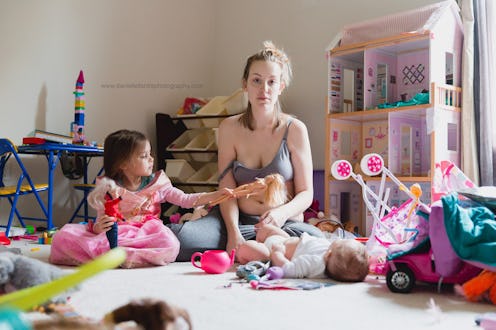Life
This Viral Photo Captures Postpartum Depression
On May 1, Kathy DiVincenzo posted two images of herself online: one in which she looks polished and perfect with her kids, and another in which she appears overrun, sad, and exhausted. Both, she said, show what it’s like to have PPD. The photos capture the reality of postpartum depression (PPD) so well that they’ve gone hugely viral, to the tune of nearly 72,000 shares. Over 13,000 people have commented with messages of support — and to say that they, too, have experienced PPD, a condition that, despite being very common, is still often surrounded by silence.
In a moving Facebook post, DiVincenzo, a doula, childbirth educator, and mother of two, wrote about her experiences with postpartum depression and the need to speak out against the pressure on new moms to be happy 100 percent of the time. “[A]s someone with diagnosed postpartum depression, anxiety, and OCD I feel like it's time to show you what that can really look like, not just the side of me that's ‘Facebook worthy,’” she wrote. DiVincenzo’s post includes two photos by a friend, photographer Danielle Fantis, who has shared her own story of coping with PPD on Facebook.
Fantis took the first photo as a candid shot, after DiVincenzo had been breastfeeding her son, according to Cosmopolitan. The image shows a playroom in disarray, and DiVincenzo looking at the camera, tired and unsmiling. The second image was posed, and shows an organized play area with a smiling, put-together mom in the center.
In her post, DiVincenzo points out that the second image isn’t false — it just doesn’t show the whole picture. “The truth is, both of these pictures represent my life depending on the day,” she wrote. “I would only ever comfortably share one of these realities though and that's the problem.” The stigma against mental illness and PPD pressures women to keep the challenges that so many of them face hidden away. DiVincenzo explained:
The only thing more exhausting than having these conditions is pretending daily that I don't. I work twice as hard to hide this reality from you because I'm afraid to make you uncomfortable. I'm afraid you'll think I'm weak, crazy, a terrible mother, or the other million things my mind convinces me of and I know I'm not alone in those thoughts.
The American Psychological Association reports that one in seven mothers experiences postpartum depression, a condition with symptoms including panic attacks, anxiety, mood swings, intense sadness, extreme fear, and disinterest in people. Although there are certain risk factors associated with PPD, any new mother can have it, regardless of previous mental health history, marital status, the number of kids she has, her economic status, race, or education.
“We need to stop assuming that the postpartum period is always euphoric, because for 1 in 7 it's not,” DiVincenzo said. “We need to start asking new parents how they're doing in a deeper way than the normal, ‘so how are you doing?’ that triggers the knee jerk, ‘everything's great!’ response. We need to learn the signs, symptoms, risk factors, and support plans for postpartum conditions.” In short, we need to create space for new mothers to be honest about how they really feel — without stigmatizing those who are struggling.
DiVincenzo ended her post with a message of support for other moms. “In case no one has told you, you're doing an amazing job,” she wrote. “You are loved and you are worthy. You're not alone.”
You can find support and information about PPD at Postpartum Support International.
